Moondance Bowel Cancer Project
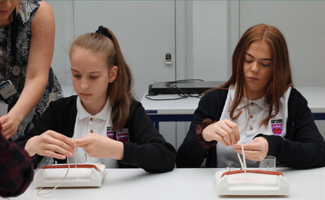
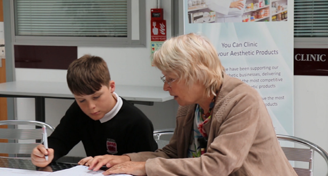
Recognising that colorectal cancer cases within our local authority (Rhondda Cynon Taf) is the fourth most common cancer, and higher than the Wales average, an initial partnership was formed between Pontypridd High School and the Moondance Cancer Initiative charity in 2019. Pontypridd High worked in partnership with a range of health professionals based within the UHB of Cardiff and the Vale. The aim was to deliver an education programme that could support the work of health colleagues in relation to this critical, but treatable health issue. The programme would be authentic, meaningful and relevant to our pupils and adults in the local community.
A focus for the learning programme has been to improve the pupils understanding of cancer and in particular bowel cancer from causes to screening and recovery rates. The importance of screening as a part of this learning is crucial because early diagnosis and treatment brings much higher survival rates. Screening data shows that in some areas of ther school catchment the uptake for those ekligible adults is below 50% against a national average that is above 60%
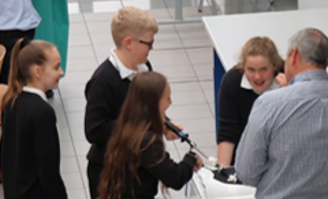
Responding to that stark statistic, pupils have used their learning to help make a difference in their community, working through the learning programme to pass on this important message to parents, carers and other family members.
Building on the successful pilot work at Pontypridd High, the project grew in 2021/22 to include six RCT secondary schools within the Cwm Taf Morgannwg Health Board region. The partnership and collaboration between education and health professionals has been fundamental to the quality of resources and learning included in this programme and each school has been able to develop new delivery models, in their own way - in their localities.
Cwm Taf Morgannwg UHB conducted their own evaluations of the work of the six schools and concluded there had been 115% rise in requested bowel screening kits in the local area of RCT where the six schools delivered the programme. This compared to a 22% increase in a neighbouring part of the local authority. Furthermore, they reported that there had been a 72% rise in the number of screening tests returned in our area which is a significant and the health board confirmed that the work in schools had contributed greatly to this improvement.
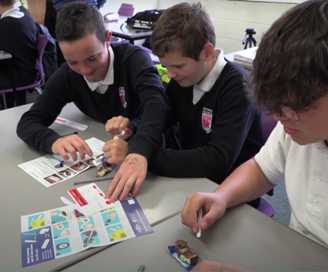
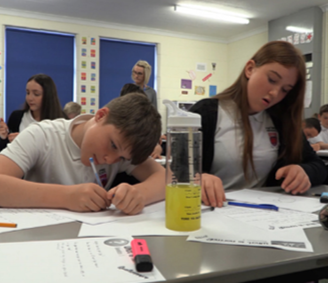
The impact on pupil engagement has also been clear, with each school evolving the project as it introduces Curriculum for Wales in Years 7 and 8. Lessons have developed cross-cutting skills and involved Science and Technology, Languages, Literacy and Communication, and Health and Well-being, the authentic context bringing real-world learning into the classroom. Co-ordinator Marie Sidoli says “Pupils see the ‘why’ of learning when they work with real health statistics such as those for bowel cancer and they are highly engaged. And of course the whole project fits naturally with the four purposes.’
For pupils a recent highlight has been the development of a digital conference event where hundreds of pupils were able to listen to education and health professionals and also to explore the many different career opportunities that both sectors offer. This engaging tool has engaged even the most challenging pupils.
Staff are also enjoying delivering the learning programmethe. They’ve talked about it broadening their experience and encouraging them to introduce more real local, community health issues into their teaching because of the response they’ve had from pupils and from parents and carers.
Community engagement has been very strong, with each school able to link with a partner in the Health Board. Close working means there are joint planning meetings with new topics like diabetes and health literacy likely to be added to the agenda. As a concept there is clear potential to take this into other regions where health priorities may be different.
For 2022/23 the aim has been to share the experiences with other schools and health board regions across Wales with the intention that this learning programme can be deliveredd and adapted in new contexts. Hence the engagement this year of a further 24 secondary schools from 5 different LA areas that represent 4 different health board regions. In addition to this there is the inclusion of all 7 of the Pontypridd High cluster primary schools.
This learning programme is an investment to influence long-term behaviour change within younger generations by educating them about cancer, cancer treatment, and the connection to healthy behaviours. It aligns with the new curriculum in Wales, and contributes to the national aim to develop healthy, confident, informed citizens. It also explores intergenerational learning, by raising awareness of bowel screening, signs and symptoms amongst the wider school community alongside teaching the dedicated cancer module.
An underlying strength of the partnerships that have been established is the ability to influence, address inequalities and support the people of Wales in not only changing outcomes for cancer and bowel cancer but providing a template through which key health messages can be communicated to children and to the wider school community.
This approach to learning in schools has much greater potential which is being recognised by many other schools in Wales and within different health board regions. Jeremy Miles, the Welsh Government Minister for Education and Welsh Language is very supportive and believes that the model we have developed is ‘a fascinating and important project genuinely linking the schools to other schools and the community, with Curriculum for Wales values at its heart’.
The education of young people is fundamental to improvements in the future and though the work pioneered at Pontypridd High School we are now showing how a new generation can change things, influence choices and in relation to cancer and bowel cancer help people live more healthily and longer.
You can see a film of our work on the Moondance Cancer Initiative website.
